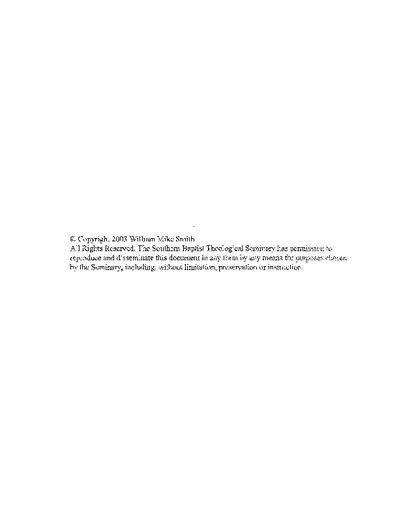A comparative analysis of selected pastors' personality profiles and their conflict management styles
Subject
Conflict management--Religious aspects--ChristianityClergy--Conduct of life
Clergy--Psychology
Abstract
This dissertation is a comparative analysis of selected pastors' personality profiles and their conflict management styles. As pastors understand their personalities, this will decrease conflict within themselves and with church members.
This research presents three theological presuppositions. They are shared and examined by detailed biblical word studies and biblical examples. It was determined that this research presents the unique study of relationship using the DISC personality profile and Speed Leas' "Discover Your Conflict Management Style." Similar studies were examined and critiqued. The study involved 1,532 pastors in East Texas. The correlation coefficient Pearson (r) was utilized to examine relationships of pastors in their relationship of personality profile and conflict management style, along with scatter plots, and the Chi-square.
The significance of the study is that there is a relationship between pastors' personalities and their conflict management styles. Pastors who are (D)ominance in personality tend to have a Persuade conflict management style. Pastors who are (I)nfluencing in personality tend to exhibit a Collaborate conflict management style. Pastors who are (S)teadiness in their personality tend toward a Collaborate style of conflict management. Lastly, those pastors who are (C)ompliance in personality tend to have a Persuade conflict management style.
The research found that years in the ministry have little or no effect upon pastors' personalities. Those with less than six years experience and those with twenty-one or more years experience tend to be Collaborate in their conflict management style. All other pastors are inclined to be Persuade.
Another significant finding of the research is that the more conflict a pastor faces, the more likely he is to be Persuade in his conflict management style. The education of a pastor affected his conflict management style if he obtained a doctoral degree, making him more likely than any other group to be Persuade.
The research will be helpful to pastors to better understand who they are and how they respond to conflict. The research can serve as a resource for churches in leadership development. The research can provide valuable information for church pastor search committees. The committee could administer the survey to a prospective pastor, and together they could discuss his personality and conflict management style as it pertains to the needs of that church. The research can serve as a foundation for future research in this area.

